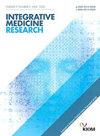Herbal decoctions for dysmenorrhea under universal health coverage pilot project: Evidence from a nationwide claims database in the Republic of Korea
IF 3
4区 医学
Q2 INTEGRATIVE & COMPLEMENTARY MEDICINE
引用次数: 0
Abstract
Background
Despite its high prevalence, dysmenorrhea is an underestimated gynecological disorder. To enhance the service coverage, the Pilot Project for Expanding National Health Insurance (NHI) Coverage to Herbal Decoctions (HDs) was implemented in the Republic of Korea from November 2020. This study aimed to assess the effectiveness and safety of HDs for dysmenorrhea at a nationwide level. Additionally, its impact on accessibility was explored.
Methods
This retrospective observational study used claims data from the pilot project (November 1, 2020, to April 28, 2024). A linear mixed-effects model was used to estimate symptom improvement during the HD exposure period. Time series data decomposition and structural change points detection were performed using NHI statistics on dysmenorrhea patient counts for those who received medical services between 2014 and 2023.
Results
Among 39,574 participants, a descriptive analysis of 7016 suggested a tendency to receive HD treatment for moderate-to-severe symptoms. Effectiveness analysis demonstrated that HD significantly reduced symptom severity over time (β = –0.072, p < 0.001). Adverse events were reported by 0.58 % of the patients, mostly involving gastrointestinal symptoms. Following the initiation of the pilot project, a significant increase in the number of patients with dysmenorrhea receiving traditional Korean medicine (TKM) services was observed.
Conclusion
The nationwide pilot project showed clinical effectiveness and a manageable safety profile of HDs for dysmenorrhea. The universal health coverage initiative appeared to have improved the accessibility of TKM services for managing dysmenorrhea. Further robust research utilizing nationwide real-world data is required to validate these findings.
全民健康覆盖试点项目下治疗痛经的草药煎剂:来自大韩民国全国索赔数据库的证据
背景:尽管痛经的发病率很高,但它是一种被低估的妇科疾病。为扩大服务覆盖面,自2020年11月起,韩国实施了将国民健康保险(NHI)覆盖面扩大到草药煎剂(HDs)的试点项目。本研究的目的是在全国范围内评估HDs治疗痛经的有效性和安全性。此外,还探讨了其对可达性的影响。方法回顾性观察研究使用试点项目(2020年11月1日至2024年4月28日)的索赔数据。使用线性混合效应模型来估计HD暴露期间症状的改善情况。对2014 - 2023年接受医疗服务的痛经患者数量进行NHI统计,进行时间序列数据分解和结构变化点检测。结果在39,574名参与者中,对7016名参与者的描述性分析表明,他们倾向于在中度至重度症状时接受HD治疗。有效性分析显示,随着时间的推移,HD显著降低了症状严重程度(β = -0.072, p <;0.001)。有0.58%的患者报告了不良事件,主要涉及胃肠道症状。试点项目启动后,观察到接受韩国传统医学服务的痛经患者人数显著增加。结论hdd治疗痛经的临床效果良好,安全性可控。全民健康覆盖倡议似乎改善了治疗痛经的TKM服务的可及性。需要进一步利用全国实际数据进行强有力的研究来验证这些发现。
本文章由计算机程序翻译,如有差异,请以英文原文为准。
求助全文
约1分钟内获得全文
求助全文
来源期刊

Integrative Medicine Research
Medicine-Complementary and Alternative Medicine
CiteScore
6.50
自引率
2.90%
发文量
65
审稿时长
12 weeks
期刊介绍:
Integrative Medicine Research (IMR) is a quarterly, peer-reviewed journal focused on scientific research for integrative medicine including traditional medicine (emphasis on acupuncture and herbal medicine), complementary and alternative medicine, and systems medicine. The journal includes papers on basic research, clinical research, methodology, theory, computational analysis and modelling, topical reviews, medical history, education and policy based on physiology, pathology, diagnosis and the systems approach in the field of integrative medicine.
 求助内容:
求助内容: 应助结果提醒方式:
应助结果提醒方式:


